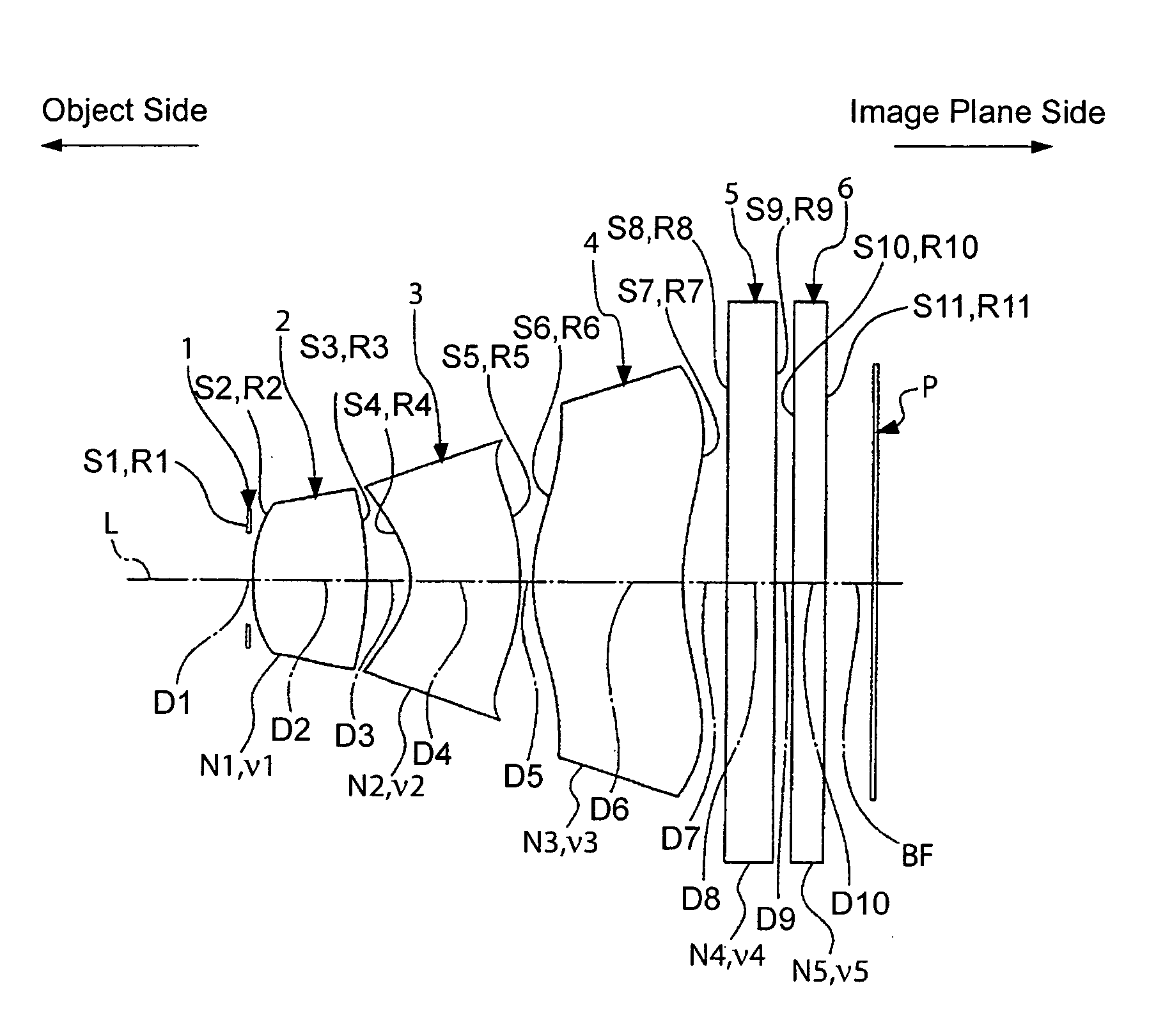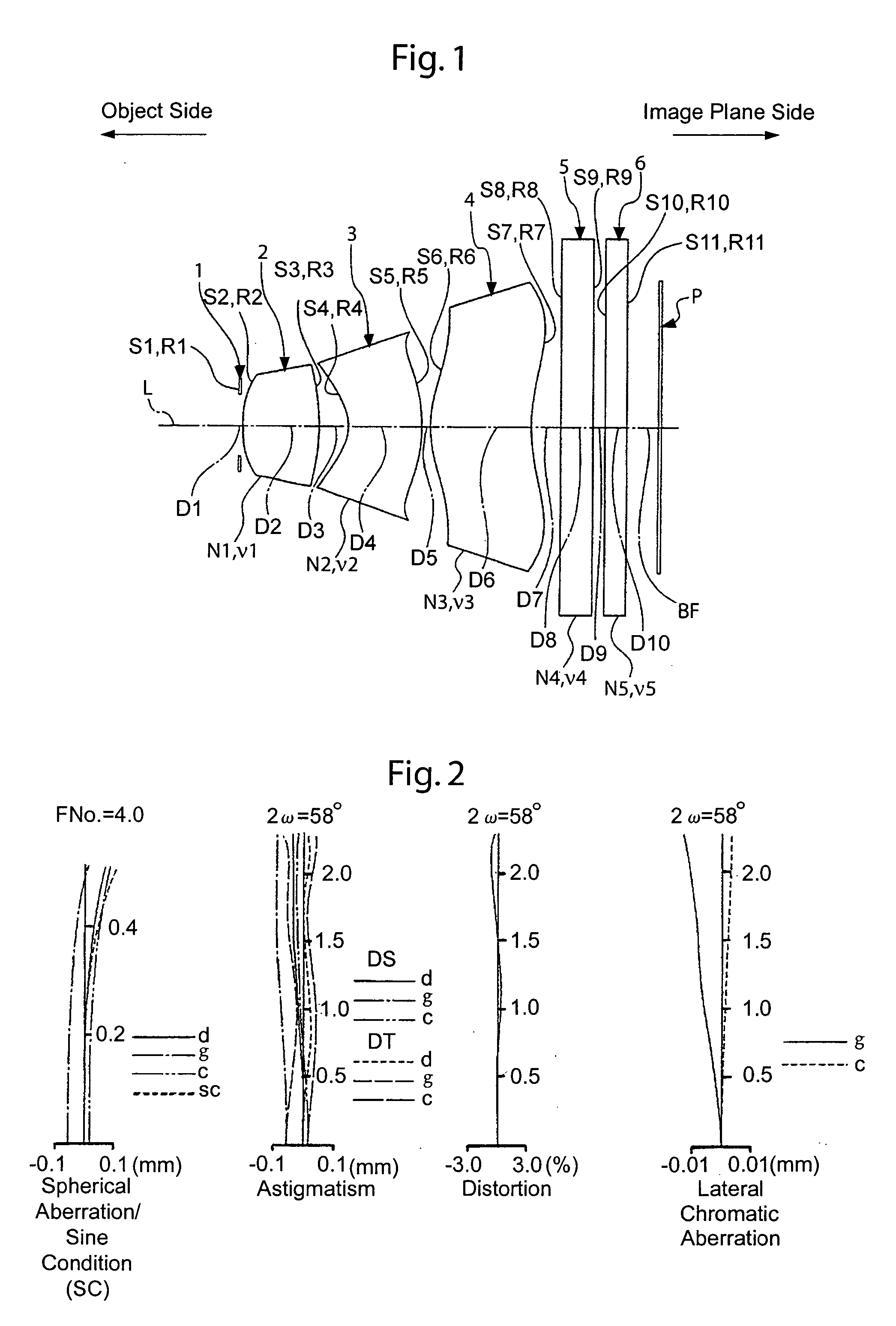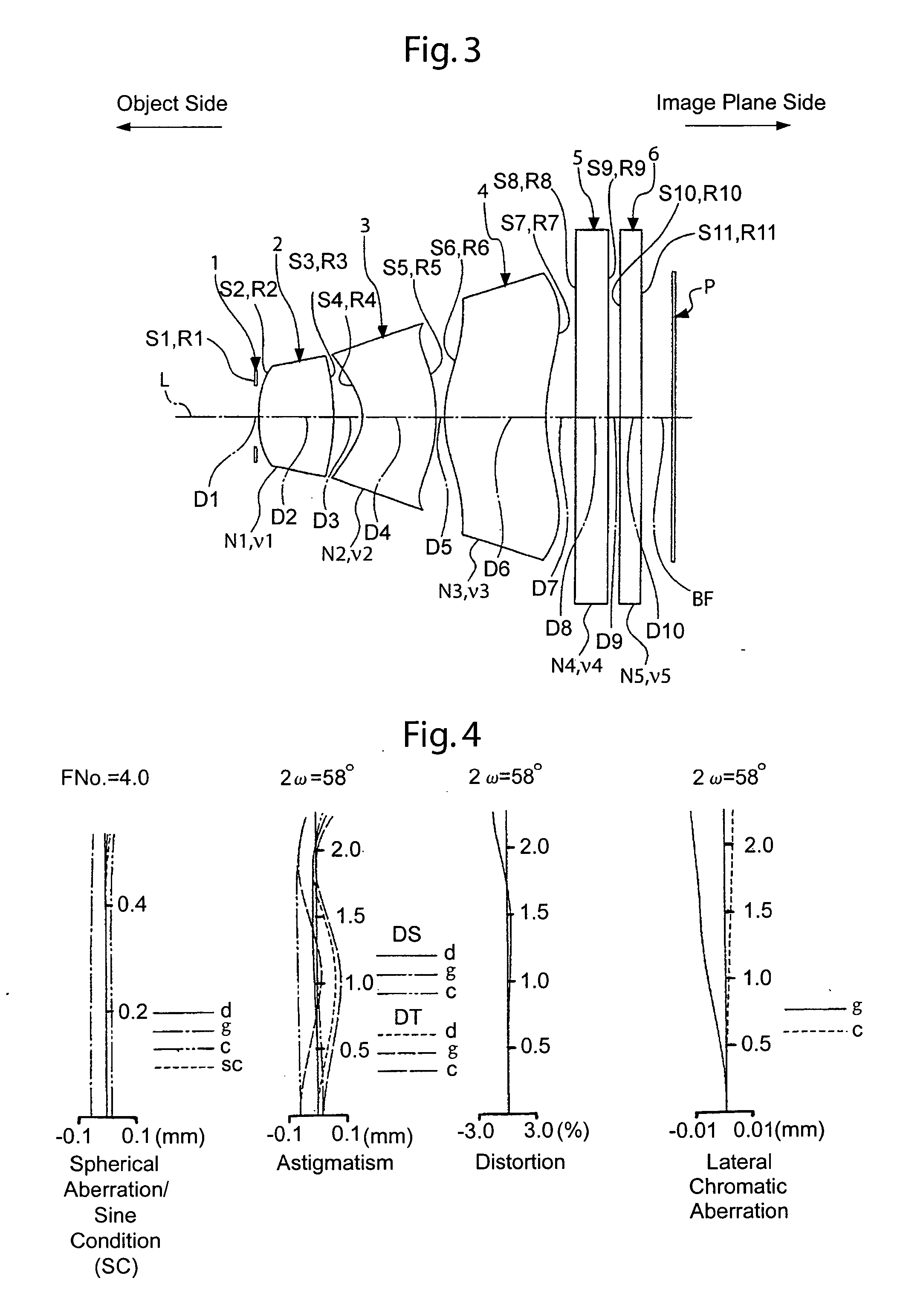Imaging lens
- Summary
- Abstract
- Description
- Claims
- Application Information
AI Technical Summary
Benefits of technology
Problems solved by technology
Method used
Image
Examples
first embodiment
[0048] The basic structure of a lens system is shown in FIG. 1. The various specifications are shown in Table 1, the various numerical data (settings) are shown in Table 2, and numerical data relating to aspherical surfaces are shown in Table 3.
[0049] In this embodiment, the numerical data for each condition is as follows: (1) TL / f=5.79 / 4.10=1.41; (2) v1=70.4; (3) (D3+D5) / f=(0.41+0.13) / 4.1=0.13.
TABLE 1Object Distance700Angle of View58°(mm)(2 ω)Focal Length f (mm)4.1Total Length TL of Lens System 5.79(Front Surface of Aperture Stop toImage Surface)(Air Conversion Distance)(mm)F Number4.0Back Focus 1.41(Air Conversion)(mm)
[0050]
TABLE 2CurvatureradiusDistanceIndex of RefractionAbbeSurface(mm)(mm)(line d)numberS1R1∞Aperture StopD10.05S2R21.893D21.12N11.48749ν170.4S3R3−4.187D30.41S4*R4−0.981D41.17N21.50914ν256.4S5*R5−2.397D50.13S6*R62.114D61.50N31.50914ν356.4S7*R73.019D70.45S8R8∞D80.30N41.51633ν464.1S9R9∞D90.20S10R10∞D100.30N51.51633ν564.1S11R11∞BF0.40
*aspherical surface
[0051]
TABLE ...
second embodiment
[0053] The basic structure of a lens system is shown in FIG. 3. The main specification data are shown in Table 4, the various numerical data (settings) are shown in Table 5, and numerical data relating to aspherical surfaces are shown in Table 6.
[0054] In this embodiment, the numerical data for each condition is: (1) TL / f=6.05 / 4.30=1.41; (2) v1=70.4; (3) (D3+D5) / f=(0.43+0.10) / 4.3=0.12.
TABLE 4Object Distance700Angle of View58°(mm)(2 ω)Focal Length f (mm)4.3Total Length TL of Lens System 6.05(Front Surface of Aperture Stop to Image Surface)(Air Conversion Distance)(mm)F Number4.0Back Focus 1.64(Air Conversion)(mm)
[0055]
TABLE 5CurvatureradiusDistanceIndex of RefractionAbbeSurface(mm)(mm)(line d)numberS1R1∞Aperture StopD10.05S2R22.152D21.15N11.48749ν170.4S3R3−3.497D30.43S4*R4−0.954D41.15N21.50914ν256.4S5*R5−2.281D50.10S6*R62.094D61.53N31.50914ν356.4S7*R72.881D70.45S8R8∞D80.45N41.51633ν464.1S9R9∞D90.20S10R10∞D100.30N51.51633ν564.1S11R11∞BF0.40
*aspherical surface
[0056]
TABLE 6Aspherica...
third embodiment
[0058] The basic structure of a lens system is shown in FIG. 5. The main specification data are shown in Table 7, the various numerical data (settings) are shown in Table 8, and numerical data relating to aspherical surfaces are shown in Table 9.
[0059] In this embodiment, the numerical data for each condition is: (1) TL / f=5.44 / 3.75=1.45; (2) v1=70.4; (3) (D3+D5) / f=(0.49+0.10) / 3.75=0.16.
TABLE 7Object Distance700Angle of View65 °(mm)(2 ω)Focal Length f (mm)3.75Total Length TL of Lens System 5.44(Front Surface of Aperture Stopto Image Surface)(Air Conversion Distance)(mm)F Number2.8Back Focus 1.70(Air Conversion)(mm)
[0060]
TABLE 8CurvatureradiusDistanceIndex of RefractionAbbeSurface(mm)(mm)(line d)numberS1R1∞Aperture StopD10.05S2R21.934D21.00N11.48749ν170.4S3R3−38.00D30.49S4*R4−1.038D40.94N21.50914ν256.4S5*R5−1.465D50.10S6*R61.920D61.16N31.50914ν356.4S7*R72.108D70.50S8R8∞D80.45N41.51633ν464.1S9R9∞D90.20S10R10∞D100.30N51.51633ν564.1S11R11∞BF0.50
*aspherical surface
[0061]
TABLE 9Aspheri...
PUM
 Login to View More
Login to View More Abstract
Description
Claims
Application Information
 Login to View More
Login to View More - R&D
- Intellectual Property
- Life Sciences
- Materials
- Tech Scout
- Unparalleled Data Quality
- Higher Quality Content
- 60% Fewer Hallucinations
Browse by: Latest US Patents, China's latest patents, Technical Efficacy Thesaurus, Application Domain, Technology Topic, Popular Technical Reports.
© 2025 PatSnap. All rights reserved.Legal|Privacy policy|Modern Slavery Act Transparency Statement|Sitemap|About US| Contact US: help@patsnap.com



